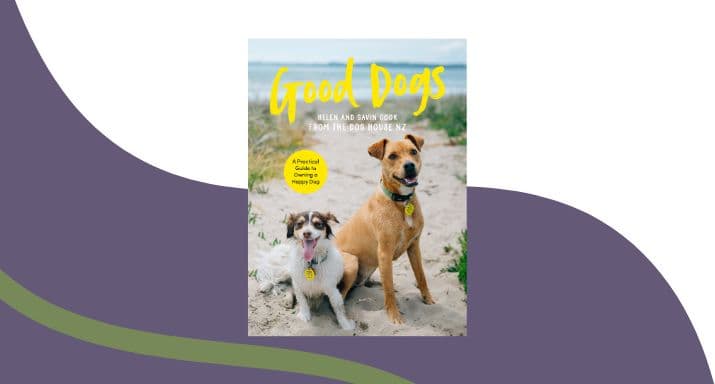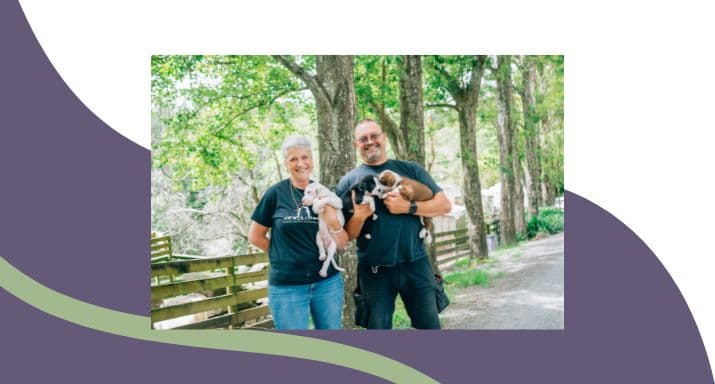Extract: Good Dogs, by Helen and Gavin Cook
From the faces behind TV2's hit show, The Dog House NZ, comes a mix of practical information and dog love stories of successful matches, highlighting what it takes to be a responsible – and happy – dog owner.
Extracted from Good Dogs by Helen and Gavin Cook. Published by Allen & Unwin. RRP $45.00. Out now.

Why get a rescue dog?
If you have considered all the factors and decided the time is right for you to get a dog, the next question is: where are you going to get it from? Of course, we would suggest a rescue or animal shelter, where there are dogs that desperately need homes. There are already so many dogs in the world, so it makes sense to us to take in a rescue dog, rather than go to a registered breeder or, worse, get a dog from a backyard breeder or a ‘puppy mill’, where animals might be being kept in unhealthy or unkind conditions, kept in cages and discarded if they are no use for breeding.
A reputable rescue organisation can provide guidance and assistance in finding a dog that matches your personality, lifestyle and specific needs, and help you deal with any issues that arise. At Country Retreat, we specialise in rehoming mother dogs and their puppies. We put a lot of time and effort into taking care of the dogs and working with them to get them to a place where they can be adopted, and we want the match to work as much as you do!
If you adopt a very young rescue puppy, especially from an experienced rescue like ours, it should be like adopting any puppy, without any innate behavioural problems from past trauma, and you can train it and mould it as it grows up. Adopting an older puppy or adult dog that has been exposed to abuse, malnutrition or abandonment may mean it has some habits and anxieties which will have to be worked through. Nevertheless, in our experience it is these dogs that seem to have the most love to give. While they may have been hurt or mistreated in the past, many of them still crave love and affection and human connection, and respond so well to kindness and living in a safe, happy home where they have their needs met.
Ralph was a five-month-old huntaway–Rottweiler cross who came to our sanctuary. He had bruising over 95 per cent of his body and was losing sight in one eye from being mistreated. His original owner was going to kill him, but a visitor to the property took him away and brought him to us. When we first got him, he couldn’t even sit down because of his injuries. But he is such a lovely puppy, so gentle and calm — a great example of how much love a dog can give even after being through absolute hell. He will play with the other dogs, but mostly just wants to be with people and snuggle with them. Fortunately, he didn’t lose his injured eye, although it is cloudy and he has reduced vision in it, and he will make someone the most wonderful pet when he is ready to be adopted.
Another benefit of getting a rescue dog is that, while there will be an adoption fee to pay, and all the other usual expenses of having a dog, it will be a lot cheaper than buying a pure-bred puppy or designer cross-breed. Since Covid especially, prices have risen off the scale — you might be looking at paying $2000 or more even for an unpapered puppy, and still more for a pedigree dog.
In recent years a lot of people have paid outrageous prices for pure-breds and designer cross-breeds, and that’s driven a lot of backyard breeders.
And when backyard breeders can’t sell them, they often just dump them. So while we used to get a lot of Staffy or Labrador crosses at the sanctuary, now we are getting quite a few other breeds coming through, including more desirable and fashionable breeds.
But people don’t only want a rescue dog to save money upfront. Often it’s because they want to do good, and give a dog in need the chance of a happy life. We have to be careful, because some people have massive hearts and want to take on a dog with issues or special needs, but don’t realise the time and effort that’s going to be involved. It’s a balancing act trying to find out how much time people have, what they want to do with their dog and how experienced they are as an owner.

Rescue dog . . . or pure-bred?
If you are weighing up the pros and cons of a rescue dog versus a pure-bred dog or ‘designer’ blend, here are some other factors to consider.
Uniqueness: Most rescue dogs are cross-breeds, and often without a DNA test (yes, you can get your dog’s DNA tested) it’s impossible to tell which breeds are in the mix. Their size, appearance and temperament may not be fully known until they mature, and can vary even within a litter of puppies — we’ve had litters here where the size range of the dogs once they were adults was huge. This can be part of the charm and adventure of adopting a rescue dog. Some people are looking for a specific breed because of how it looks, and can’t be budged on that, but if you are prepared to be more flexible, then you may be surprised at what you can find in a rescue dog.
Unpredictability: Some people also want specific breeds because of their perceived behavioural characteristics or personality, but those are not always guaranteed, even in a pure-bred dog. Each dog is a unique individual, with its own traits and quirks. And while pure-breds generally have more predictable physical and behavioural traits, they may also be prone to certain breed-specific health issues. It’s important to choose a reputable breeder if opting for a pure-bred, and to look into health issues associated with that breed. With a cross-breed, especially one of unknown parentage, it’s a bit more of a lottery as to what traits might turn up. Adopting a rescue dog is an ongoing adventure!
Background: Rescue dogs may have a history that impacts their behaviour and needs. You may never know what the dog has experienced before its time at the rescue centre or pound. All dogs that are rehomed will have their quirks, and especially those that have had traumatic lives and been hurt or abandoned. (At Country Retreat, while it’s generally easy for us to find homes for puppies, it can be harder to rehome adult dogs, especially those that may have developed behavioural problems from being mistreated.) However, some rescues, especially nowadays, will be loved family pets that have had good lives but now need a new home due to changes in their owners’ circumstances. Just because a dog is a rescue doesn’t mean it’s going to be aggressive or have major behavioural issues. All dogs need training and consistent boundaries.
Gratitude: It seems funny to say it, but many rescue dogs seem to know that they have been given a second chance at life and seem extra- grateful for the love and care you give them. Dogs are naturally a pack animal and feel happiest when they are with their special humans. If they have had a period of being abandoned or mistreated, the love you are able to give them now is extra special.
Gavin and Helen Cook run Country Retreat Animal Sanctuary in Warkworth, New Zealand, where they rescue animals in trouble, with a focus on pregnant dogs and puppies. They are the stars of TVNZ's popular television series The Dog House New Zealand.